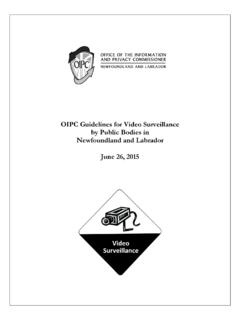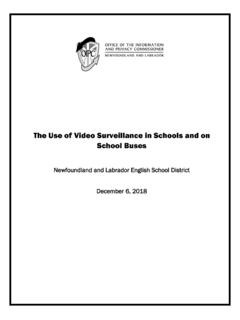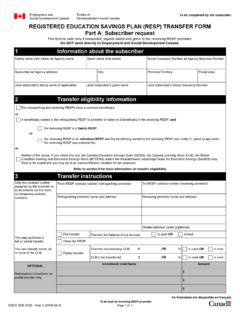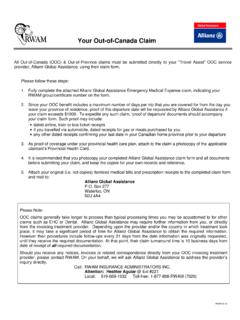Transcription of Report P-2017-003 August 16, 2017 Human …
1 File#: 0035-068-17-004 Report P- 2017 -003 August 16, 2017 Human resource secretariat Summary: After publicly posting salary disclosures pursuant to the Public Sector Compensation Transparency Act (the PSCTA), the Public Body was advised by a journalist that there appeared to be disclosures in regards to officers of the Royal Newfoundland Constabulary (RNC) that had been exempted from disclosure. Additional review identified the disclosure of a substantial amount of other personal information outside of that authorized for disclosure by the PSCTA. The Commissioner conducted an own motion investigation pursuant to section 73(3) of the Access to Information and Protection of Privacy Act, 2015 (the ATIPPA, 2015 or the Act).
2 The investigation determined that there were breaches of privacy pursuant to the ATIPPA, 2015. The breaches, while inadvertent, could have been avoided by the employment of adequate safeguards, resources and review processes. Statutes Cited: Access to Information and Protection of Privacy Act, 2015, SNL 2015, c ; Public Sector Compensation Transparency Act, SNL 2016, c ; Public Sector Compensation Transparency Regulations, NLR 81/16; Public Sector Compensation Transparency Act, SA 2015, c 2 R Report P- 2017 -003 I BACKGROUND [1] On June 30, 2017 the Human resource secretariat (HRS) published its inaugural compensation disclosure list pursuant to the PSCTA. Disclosures outside of those authorized under the PSCTA led to a privacy complaint to the OIPC.
3 As that complaint related to only one group of affected employees, an own motion investigation was commenced. The original complaint was withdrawn as the complainant was satisfied that our investigation would address concerns specific to RNC officers. [2] Lists of salaries paid to government employees and other public servants are generally referred to in Canada as Sunshine Lists . Among provinces, Ontario appears to have published the first such list in 1996 as an important check on the public Seven other provinces now annually publish similar [3] These lists elicit strong reactions from the public, both for and against. Many people question the relevance of including names on the list, and ask why positions or titles are not sufficient on their own.
4 Usage of names has led to coinage of the label salary pornography by some in the Others argue that names are essential to assess qualifications, value, pay equity, nepotism, political favouritism and other concerns. Some question the salary benchmark of $100,000 and the failure to account for inflation. [4] Ultimately, it is for governments to decide the extent and content of proactive salary disclosure in the form of legislation. In Newfoundland and Labrador the first so called sunshine list did not result from proactive disclosure but rather from access to information requests pursuant to the ATIPPA, 2015. The Applicant sought to utilize the Act to acquire and compose a list of salaries of public body employees. In the absence of legislation similar to the PSCTA, that information was not otherwise published in that format.
5 That process led to litigation that is currently before the Court of Appeal4 and as such, will not be discussed in detail in this Report , as one of the issues in that appeal is whether the disclosure of names and salaries is an unreasonable invasion of privacy in the context of the ATIPPA, 2015. For 1 2 Newfoundland and Labrador, Nova Scotia, New Brunswick, Manitoba, Saskatchewan, Alberta and British Columbia. 3 4 Court File #: 2017 01H 0010 3 R Report P- 2017 -003 the purposes of this Report , any salary disclosures not authorized by the PSCTA constituted breaches of section 64(1)(a) of the ATIPPA, 2015. [5] The PSCTA came into force on December 14, 2016, a significant move towards transparency that is viewed favourably by this Office.
6 It requires that core government departments, and the public bodies listed in Schedule A to the Public Sector Compensation Transparency Regulations (the PSCT Regs), annually publish (prior to July 1) the total compensation of all employees earning in excess of $100,000 per year. Total compensation is defined in the PSCTA as: 2(i) "total compensation" means the total amount of compensation paid in a year to an employee, but does not include leave payout or an amount paid in lieu of notice upon termination of employment. [6] Employees can apply individually or as a group to be exempt from having their total compensation published: 7. (1) The deputy minister of a department or the chief executive officer of a public body may exempt information from being disclosed regarding an employee where (a) a written application is submitted in the time period prescribed in the regulations, by, or on behalf of, the employee to (i) the deputy minister of the department where the employee is employed, or (ii) the chief executive officer of the public body where the employee is employed; and (b) the deputy minister of the department or the chief executive officer of the public body is of the opinion that disclosure of the information could reasonably be expected to threaten the safety or mental or physical health of the employee.
7 8. (1)The Lieutenant-Governor in Council may exempt information from being disclosed regarding a category of employees where the Lieutenant-Governor in Council is of the opinion that disclosure of the information could reasonably be expected to threaten the safety or mental or physical health of those employees. (2) The Lieutenant-Governor in Council may prescribe in the regulations other grounds to exempt information from being disclosed regarding a category of employees. 4 R Report P- 2017 -003 [7] The ATIPPA, 2015 requires public bodies to take reasonable steps to ensure that personal information is protected from unauthorized disclosure: 64. (1) The head of a public body shall take steps that are reasonable in the circumstances to ensure that (a) personal information in its custody or control is protected against theft, loss and unauthorized collection, access, use or disclosure; (b) records containing personal information in its custody or control are protected against unauthorized copying or modification; and (c) records containing personal information in its custody or control are retained, transferred and disposed of in a secure manner.
8 [8] Authorized disclosures of personal information by public bodies are generally those permitted or required by law or with consent. The PSCTA requires disclosure of names, titles, departments and total compensation of employees covered by it and not exempted from it. [9] At 10:07 am on June 30, 2017 the Human resource secretariat (HRS) published the first iteration of a proactive sunshine list in Newfoundland and Labrador5, in both pdf and Microsoft Excel formats. Later that morning, a journalist, after downloading the information, notified HRS that it appeared that the compensation information of a group of RNC officers was published despite their having received an exemption pursuant to section 8 of the PSCTA. The HRS removed this and other unauthorized disclosures from its website at approximately 12:30pm that same day.
9 [10] On closer review, it was determined that in addition to the personal information of the 167 RNC officers exempted, other unauthorized disclosures occurred, including: employee identification numbers and payroll coding of 640 employees, including employees covered by and outside of the PSCTA; forms of compensation that do not fall within the PSCTA s definition of compensation, such as salary continuance (17 employees affected); name, title, department and total compensation of an employee whose total compensation did not meet the threshold for disclosure; names, titles, departments and total compensation of 22 employees outside of the PSCTA; and, 5 5 R Report P- 2017 -003 names, titles, departments and total compensation of 3 employees granted individual exemptions pursuant to the PSCTA.
10 [11] At the outset of our investigation we provided HRS with a list of responsive records for production. Its initial response to our request for records was received on July 18, 2017 . Its second response, addressing inquiries arising from the original response was received on August 7, 2017 . [12] As the Department of Justice and Public Safety (JPS) was extensively involved in the aftermath of the breach, especially in regards to the RNC officers, responsive JPS records were also requested. As HRS was unable to obtain records from JPS, a demand was sent by this Office to JPS on August 6, 2017 . Some records relating to its interactions with the RNC, RNCA and HRS were received from JPS on August 7, 2017 . Others have trickled in as JPS staff return from leave.







